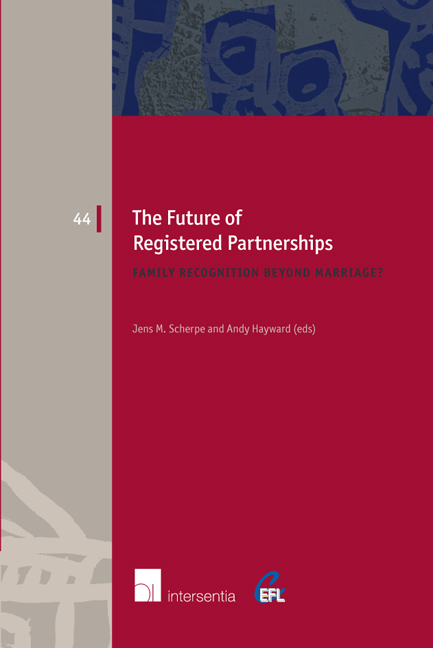Book contents
- Frontmatter
- Foreword
- Preface
- Contents
- List of Contributors
- The Future of Registered Partnerships: An Introduction
- Questionnaire
- Part I Registered Partnerships as a Functional Equivalent to Marriage
- Part II Registered Partnerships as an Alternative to Marriage
- Registered Partnerships in the Netherlands
- Registered Partnerships in France
- Part III Registered Partnerships in a Time of Transition
- Part IV Alternative Models for Registered Partnerships: Beyond Conjugality, Beyond Formality
- Part V Registered Partnerships, Discrimination and Human Rights
- Part VI Comparative Perspective and Conclusions
- Index
- European Family Law Series
Registered Partnerships in the Netherlands
from Part II - Registered Partnerships as an Alternative to Marriage
Published online by Cambridge University Press: 22 September 2018
- Frontmatter
- Foreword
- Preface
- Contents
- List of Contributors
- The Future of Registered Partnerships: An Introduction
- Questionnaire
- Part I Registered Partnerships as a Functional Equivalent to Marriage
- Part II Registered Partnerships as an Alternative to Marriage
- Registered Partnerships in the Netherlands
- Registered Partnerships in France
- Part III Registered Partnerships in a Time of Transition
- Part IV Alternative Models for Registered Partnerships: Beyond Conjugality, Beyond Formality
- Part V Registered Partnerships, Discrimination and Human Rights
- Part VI Comparative Perspective and Conclusions
- Index
- European Family Law Series
Summary
INTRODUCTION
The Netherlands has a history of being extremely pro-active in the fight for equal civil rights of many kinds of groups of citizens. When examining the Dutch Constitution, which was created back in 1815, the first article states that there shall be no discrimination based on religion, belief, political opinion, race, gender or any other grounds. The legislature is bound to take this rule into account in all legislative processes. For instance, the Netherlands is the first country in the world that legislated for same-sex couples to enter into civil marriage. Since 2001, the Netherlands has ensured equality of formal relationships between same-sex and different-sex couples. Recently, on 1 July 2014, the Transgender Act (Transgenderwet) entered into force, which allows legal acceptance of gender reassignment for persons aged 16 and above.
The above-mentioned rules are laid down in the Dutch Civil Code, which is divided into different books. Book 1 contains the rules dealing with family law and the law of persons. However, Article 7(1) of the Equal Treatment Act (Algemene wet gelijke behandeling, AWGB) is a tool to assist people dealing with non-recognition of their legal status. In 2012 – 2013, the Dutch Second Chamber of Parliament requested that the Equal Treatment Act should be amended in order to prohibit actions in which public institutions are able to draw a distinction based on gender or sexual orientation.
In recent case law the Commission of Human Rights in the Netherlands has stated that discrimination on grounds of gender is prohibited, but this rule is also applicable in the situation where one's gender identity does not fall within the category of man or woman. These introductory remarks illustrate that the Netherlands is continuously amending legislation in order to remove barriers for people to fully participate in our society. As the Netherlands is a unitary state, there are no sub-national levels in the legislative process, ensuring that there are no regional differences in the application of these laws.
ENTERING INTO A RELATIONSHIP
INTRODUCTION
Currently, same-sex couples and different-sex couples are provided the same opportunities for entry into a formalised family relationship. Both sets of couples are allowed to either (a) marry, or (b) enter into a registered partnership. As both institutions require the same formalities, they will be dealt with simultaneously in this section.
- Type
- Chapter
- Information
- The Future of Registered PartnershipsFamily Recognition Beyond Marriage?, pp. 121 - 152Publisher: IntersentiaPrint publication year: 2017



